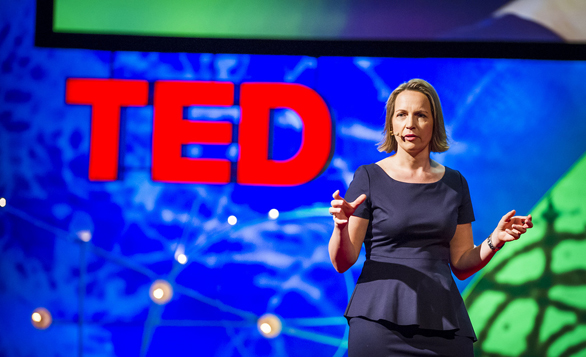
Annette Heuser speaks on why the big three credit rating agencies don’t have to have a stronghold on sovereign ratings at TEDGlobal 2013. Photo: James Duncan Davidson
Eight months after my talk at TEDGlobal 2013, much progress has been made on the International Non-profit Credit Rating Agency (INCRA) concept. The progress, however, has not been in the credit rating agency world itself, which is slow to change, despite strong criticism from political officials and, occasionally, the media.
You may recall the public outrage over ratings at the height of the Euro Crisis in 2011 and 2012. Then, the so-called “big three” credit rating agencies ― Standard & Poor’s, Moody’s and Fitch ― downgraded the US and several European countries. Dramatic headlines renewed public interest in sovereign ratings and the institutions that produce them.
 Annette Heuser: The 3 agencies with the power to make or break economies
The attention inspired me to think about a new way to address the sector’s deficiencies. Instead of approaching the problems from a regulatory angle, I developed an institutional model to addresses the shortcomings of this sector’s major players. Transparency and accountability: those are the key components for higher-quality sovereign ratings.
Annette Heuser: The 3 agencies with the power to make or break economies
The attention inspired me to think about a new way to address the sector’s deficiencies. Instead of approaching the problems from a regulatory angle, I developed an institutional model to addresses the shortcomings of this sector’s major players. Transparency and accountability: those are the key components for higher-quality sovereign ratings.
A few colleagues have called me crazy when I told them about my idea for a non-profit credit rating agency for sovereign risk. I took their skepticism as a challenge to see if the INCRA concept could work. In recent months, it’s begun to look more and more possible. At the Bertelsmann Foundation we consider ourselves to be a “think and do tank,” and we feel strongly committed to INCRA.
Recently, we have made progress towards demonstrating that it is possible to establish a non-profit structure for a rating agency in the US. We’ve continued to increase our global network of like-minded credit rating agency reformers who support the INCRA mode. We’ve increased awareness of INCRA among international policymakers and investors in sovereign bonds. And we’ve rallied support from potential INCRA investors in the corporate and public sectors. We are taking an active role in promoting the concept and determining if there is a level of support sufficient to make INCRA a reality.
But why are sovereign ratings important in the first place, you ask?
First, sovereign ratings help assess an enormous market. The value of outstanding sovereign bonds dwarfs that of all other bonds by a huge margin.
Second, as I explain in my talk, the ratings of these bonds affect each of us directly as citizens and taxpayers. Ratings assess a government’s ability and willingness to repay debts. As we have seen in the past, a downgraded government generally must contend with higher borrowing costs. This can translate into higher taxes, cuts to vital government programs and slower economic growth, changes that negatively affect the citizenry. Since sovereign ratings impact us all, I believe that they should be defined as “public goods,” something that is available to all citizens.
This is why my ratings team at the Bertelsmann Foundation has invested considerable time and effort into trying to create a model to address the conflicts of interest and lack of transparency in the ratings process, as well as the inability for the public to determine ratings criteria. The INCRA model would also ensure a truly international entity — not one that could be perceived as American or European. INCRA would give emerging economies and developing countries a role equal to that of industrialized nations. And it would be revolutionary to run a credit rating agency as a non-profit and focus solely on sovereign risk.
INCRA would differ from existing credit rating agencies in both its institutional set-up and its rating methodology. It would operate from a sustainable endowment or on an annual budget. It would rate countries worldwide at no cost to rated entities (governments) or to parties interested in reading the rating reports (e.g., investors). And INCRA would improve the quality of ratings by employing a new set of indicators and making clear how each factors into the overall rating. In addition to the traditional macroeconomic indicators, INCRA examines a comprehensive set of so-called “forward-looking indicators” that mirror a country’s socio-economic development. They assess, for instance, a government’s willingness to invest in education, its crisis-management capabilities, its overall political management and its ability to communicate policies. These are highly relevant, qualitative factors for a solid analysis of a government’s ability and willingness to repay debt, which is the focus of sovereign ratings.
In a nutshell, INCRA is designed to decrease the power of the oligopoly of the “big three” credit ratings agencies by increasing competition; establish a precedent for non-profit players operating alongside traditional, for-profit players; minimize conflicts of interest (and appearances of conflicts of interest) by providing sovereign-debt ratings to the public for free; increase the transparency of the rating process and its outcome; and increase the quality of sovereign ratings by introducing more qualitative indicators.
This project is not a sprint. It is, rather, a marathon to establish INCRA as a cornerstone for a more inclusive international financial system. Although it requires significant effort and stamina, the rewards of running a marathon are great. As Thomas Edison said, “There is no substitute for hard work.”
I hope that you’ll join us in supporting INCRA’s journey to the finish line.
Comments (6)
Pingback: Cabinet communique | Israel Foreign Affairs
Pingback: Sovereign Credit Rating Service: A Public Good? | The Second Parchment